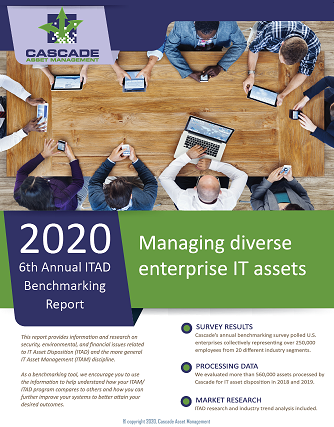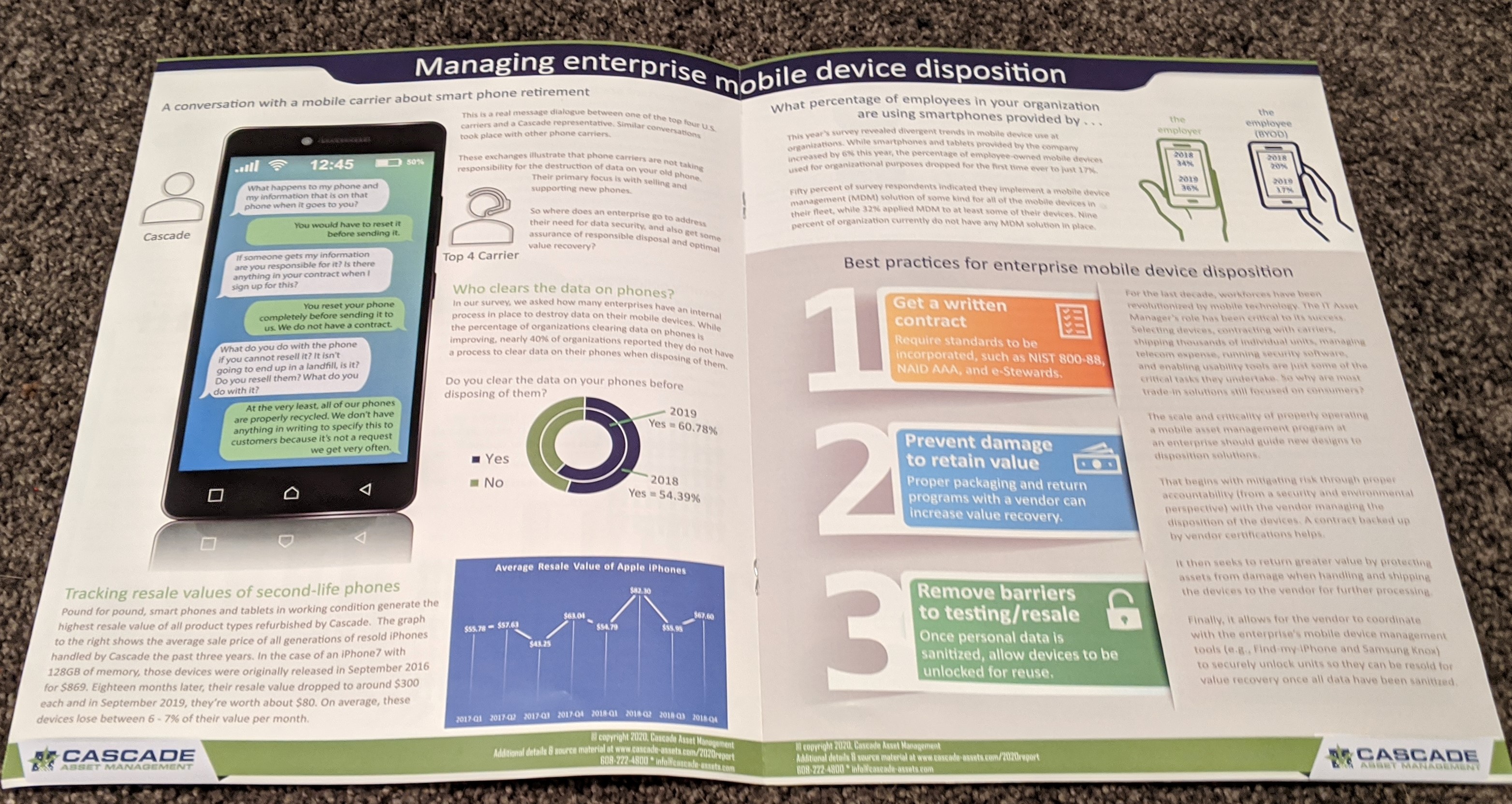MADISON, WI – January 22, 2020 – Cascade Asset Management (Cascade), a national leader in providing full-service IT asset retirement solutions to businesses and institutions, published its 6th Annual Benchmarking Report today. The study provides information and research on security, environmental, and financial issues related to IT Asset Disposition (ITAD) and the more general IT Asset Management (ITAM) discipline.
This report was built from data Cascade compiled through (1) a December 2019 customer survey representing organizations that collectively employ more than 250,000 people from 20 different industry segments, (2) an evaluation of more than 560,000 assets processed by Cascade in 2018 and 2019, and (3) a review of related industry research.
Reversing a trend from the past few years, Cascade reported a decline of 15% in the overall average resale value paid for its refurbished equipment between 2018 and 2019. While the number of desktop computers Cascade sold in 2019 compared to 2018 grew by 41%, the average price earned from the sale of these devices dropped by 12% in 2019. The number of laptops sold by last year climbed by 89%, but average prices dropped by 4%.
One contributing factor to the decline in average prices is an increase in enterprises requesting hard drives be removed and shredded from devices, thereby lowering their average resale price. In addition, the dramatic overall increase in the supply of desktops and laptops on the secondary market, influenced by enterprises completing “Win10 refreshes,” suppressed average prices.
Bucking this price decline was smartphones and tablets, which saw their average resale prices increase by 50% last year. “There is plenty of demand domestically and internationally for refurbished smartphones and tablets that are within a few generations of current models,” says Paul Keough, Resale Manager for Cascade. “It even makes sense for us to invest in the repair of damaged smartphones.”
In the survey portion of the report, enterprises said they expect a slight increase in IT hardware purchases in 2020. In this year’s survey, 23% of respondents indicated their organizations plan to spend more on IT hardware in 2020, compared to 22% which planned to spend more in 2019. For the second year in a row, significantly more organizations (from 6% in 2018 to 13% in 2019 to 20% in 2020) plan to trim their spending in future years. The majority of respondents (57%) expect to spend the same on IT hardware in 2020 as in 2019.
For laptops and desktops, the refresh rate is lengthening this year. Survey respondents are now refreshing 46.4% of their desktop computers every 4 years or less, compared to 51.7% in 2019. Laptop refreshes also stretched out this year with 64.3% planning to replace these devices every 4 years or less, compared to 67.2% reporting a 4 year or faster refresh in 2019.
This year’s survey revealed divergent trends in mobile device use in organizations. While smartphones and tablets provided by the company were reported to increase by 6% this year, the percentage of employee-owned mobile devices used for organizational purposes dropped from 20% in 2018 to 17% in 2019. “BYOD” is losing its appeal as companies work to gain better control over their mobile device fleet.
A number of survey questions were asked about asset tracking and data destruction during the retirement phase of the devices. Mobility devices gained the most this year. Over 82% of organizations reported tracking all or some of their tablets, compared to just over 70% from the previous year’s survey. Smartphone tracking increased from 43% to 66% overall. Internet of Things (IoT) devices were rarely tracked in the past, but this year’s survey indicates 48% of organizations track IoT assets.
The survey also asked Cascade customers about their understanding and interest in industry certifications. Sixty-one percent of respondents said the ISO 9001 (Quality) certification was either critically, very, or somewhat important to them. Next came the e-Stewards certification at 49%, followed by ISO 14001 (Environmental Management Systems) at 47%, NAID (Security) at 45% and R2 at 41%. These responses are all up slightly from last year, which demonstrates a continued interest in certifications for ITAD processors. That being said, more than one-third of respondents weren’t aware of any of these standards, indicating that more education is needed by the ITAD industry in this area.
The full report is posted online at: http://www.cascade-assets.com/2020report. In addition, Cascade will present the report findings as part of a webinar hosted by IAITAM in early February (date forthcoming). Additional inquiries about the findings can be directed to the author, Neil Peters-Michaud, npm@cascade-assets.com.

